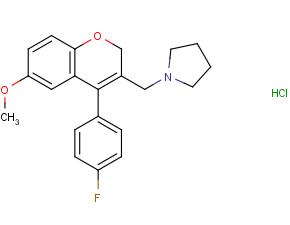
AX-024 HCl
CAS No. 1704801-24-0
AX-024 HCl( —— )
Catalog No. M17365 CAS No. 1704801-24-0
AX-024 hydrochloride is an cytokine release inhibitor which can strongly inhibit the production of interleukin-6 (IL-6), tumor necrosis factor-α (TNFα), interferon-γ (IFN-γ), IL-10 and IL-17A.
Purity : >98% (HPLC)
 COA
COA
 Datasheet
Datasheet
 HNMR
HNMR
 HPLC
HPLC
 MSDS
MSDS
 Handing Instructions
Handing Instructions
| Size | Price / USD | Stock | Quantity |
| 2MG | 68 | In Stock |


|
| 5MG | 105 | In Stock |


|
| 10MG | 161 | In Stock |


|
| 25MG | 375 | In Stock |


|
| 50MG | 557 | In Stock |


|
| 100MG | 791 | In Stock |


|
| 200MG | Get Quote | In Stock |


|
| 500MG | Get Quote | In Stock |


|
| 1G | Get Quote | In Stock |


|
Biological Information
-
Product NameAX-024 HCl
-
NoteResearch use only, not for human use.
-
Brief DescriptionAX-024 hydrochloride is an cytokine release inhibitor which can strongly inhibit the production of interleukin-6 (IL-6), tumor necrosis factor-α (TNFα), interferon-γ (IFN-γ), IL-10 and IL-17A.
-
DescriptionAX-024 hydrochloride is an cytokine release inhibitor which can strongly inhibit the production of interleukin-6 (IL-6), tumor necrosis factor-α (TNFα), interferon-γ (IFN-γ), IL-10 and IL-17A.(In Vitro):AX-024 hydrochloride is >10,000-fold more potent than the AX-000 hit in terms of inhibition of TCR-triggered T cell proliferation. The IC50 of AX-024 hydrochloride in this assay is 1 nM, although it shows inhibitory effects at a concentration of 1 pM or less. AX-024 hydrochloride is also a much more potent inhibitor of cytokine release by human peripheral blood mononuclear cells stimulated with anti-CD3 than AX-000, strongly hindering interleukin-6 (IL-6), tumor necrosis factor-α (TNFα), interferon-γ (IFN-γ), IL-10, and IL-17A production at a concentration of 10 nM. In CD8+ T cells of OT1 TCR transgenic (OT1Tg) mice bearing wild-type (WT) AX-024 hydrochloride strongly inhibits T cell proliferation at a concentration of 0.1 nM when OT1Tg T cells are WT for the PRS mutation. Coimmunoprecipitation experiments in these cells show that Nck recruitment to the TCR is induced upon stimulation in the absence of drug but is inhibited in the presence of AX-024 hydrochloride in a dose-dependent manner at concentrations starting from 1 nM. (In Vivo):The AX-024 hydrochloride-treated group presents less scales and reduces skin thickening compare to the vehicle group. AX-024 hydrochloride significantly reduces thickening of both skin layers, but more effectively of the dermis, which rather resembles that of mice treated with a control cream lacking imiquimod (IMQ). AX-024 hydrochloride significantly diminishes the number of airway inflammatory cells in both assays. Mice receiving AX-024 hydrochloride rapidly recovers from neurological impairment and weight loss, becoming symptom-free by day 30, unlike mice that receives the vehicle, in which ataxia and loss of the righting reflex persist.
-
In VitroAX-024 hydrochloride is >10,000-fold more potent than the AX-000 hit in terms of inhibition of TCR-triggered T cell proliferation. The IC50 of AX-024 hydrochloride in this assay is 1 nM, although it shows inhibitory effects at a concentration of 1 pM or less. AX-024 hydrochloride is also a much more potent inhibitor of cytokine release by human peripheral blood mononuclear cells stimulated with anti-CD3 than AX-000, strongly hindering interleukin-6 (IL-6), tumor necrosis factor-α (TNFα), interferon-γ (IFN-γ), IL-10, and IL-17A production at a concentration of 10 nM. In CD8+ T cells of OT1 TCR transgenic (OT1Tg) mice bearing wild-type (WT) AX-024 hydrochloride strongly inhibits T cell proliferation at a concentration of 0.1 nM when OT1Tg T cells are WT for the PRS mutation. Coimmunoprecipitation experiments in these cells show that Nck recruitment to the TCR is induced upon stimulation in the absence of drug but is inhibited in the presence of AX-024 hydrochloride in a dose-dependent manner at concentrations starting from 1 nM.
-
In VivoThe AX-024 hydrochloride-treated group presents less scales and reduces skin thickening compare to the vehicle group. AX-024 hydrochloride significantly reduces thickening of both skin layers, but more effectively of the dermis, which rather resembles that of mice treated with a control cream lacking imiquimod (IMQ). AX-024 hydrochloride significantly diminishes the number of airway inflammatory cells in both assays. Mice receiving AX-024 hydrochloride rapidly recovers from neurological impairment and weight loss, becoming symptom-free by day 30, unlike mice that receives the vehicle, in which ataxia and loss of the righting reflex persist.
-
Synonyms——
-
PathwayOthers
-
TargetOther Targets
-
RecptorIL-6| TNFα| IFN-γ| IL-10| IL-17A
-
Research Area——
-
Indication——
Chemical Information
-
CAS Number1704801-24-0
-
Formula Weight375.87
-
Molecular FormulaC21H23ClFNO2
-
Purity>98% (HPLC)
-
SolubilityDMSO : 33 mg/mL 87.80 mM; H2O : 16.67 mg/mL. 44.35 mM;
-
SMILESCl.Fc1ccc(cc1)C=3c4cc(ccc4OCC=3CN2CCCC2)OC
-
Chemical Name——
Shipping & Storage Information
-
Storage(-20℃)
-
ShippingWith Ice Pack
-
Stability≥ 2 years
Reference
1. Borroto A, etal. First-in-class inhibitor of the T cell receptor for the treatment of autoimmune diseases. Sci Transl Med. 2016 Dec 21;8(370):370ra184.
molnova catalog



related products
-
GRP-60367
GRP-60367 is the first small molecule rabies virus (RABV) entry inhibitor, which has nanomolar effect on some RABV strains.Grp-60367 inhibits the entry of a subset of the RABV strain.Grp-60367 showed the specificity and effective anti-RABV activity of the scaffold. In the dose-response analysis, the EC50s range from 2 to 52 nM in different host cell lines.
-
herbacetin-3,8-diglu...
herbacetin-3,8-diglucopyranoside is a natural product.
-
BU 224 hydrochloride
BU 224 hydrochloride is a selective imidazoline I(2) binding site ligand and has antinociceptive and antidepressant-like activities.



 Cart
Cart
 sales@molnova.com
sales@molnova.com


